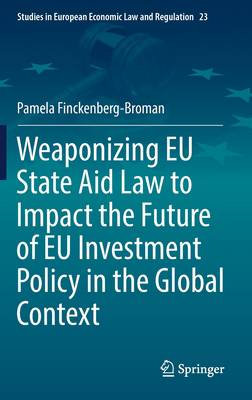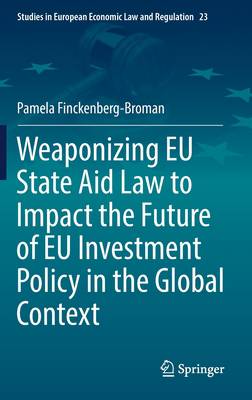
- Afhalen na 1 uur in een winkel met voorraad
- Gratis thuislevering in België vanaf € 30
- Ruim aanbod met 7 miljoen producten
- Afhalen na 1 uur in een winkel met voorraad
- Gratis thuislevering in België vanaf € 30
- Ruim aanbod met 7 miljoen producten
Zoeken
Weaponizing EU State Aid Law to Impact the Future of EU Investment Policy in the Global Context
Pamela Finckenberg-Broman
€ 105,45
+ 210 punten
Uitvoering
Omschrijving
This book provides a comprehensive analysis of how EU state aid law is shaping the future of EU investment policy in a global context. It examines in detail how EU state aid policy and practice interact with the EU investment regime on the internal market and affect the external trade relations of the Member States and the EU alike. The debate this book engages in concerns competence, i.e., which body delineates the scope of state aid law and policy (now and in the future) when and where it intersects and collides with another distinct legal field: investment protection. Pursuing a doctrinal approach to the topic in the light of EU law and international law, the book analyses the interaction of the EU's trade, state aid and investment policy. This is done by posing the following research question: How is EU state aid law shaping the future of EU investment policy in a global context? Further, the book puts forward three corresponding arguments. First, this influence can be seen in the EU's incorporation of clauses promoting fair competition and state aid policy in international trade agreements. Second, EU state aid law and policy contributed to recent internal developments which led the Member States to terminate their bilateral agreements with each other (intra-EU BITs) by the end of 2019. Third, the EU has been working to replace the BITs between its Member States and third countries (extra-EU BITs) with its own trade agreements, which are aligned with EU legislation. This combined analysis of EU law and international law yields a number of interesting conclusions.
The book addresses a highly topical and rapidly evolving area of EU law and international investment law. It is also the first book to provide a comprehensive approach to the interplay of state aid rules and EU investment policy internally and externally, i.e., within the EU and on a global scale. As such, it closes an important gap in the extant literature on international and EU law.
The book addresses a highly topical and rapidly evolving area of EU law and international investment law. It is also the first book to provide a comprehensive approach to the interplay of state aid rules and EU investment policy internally and externally, i.e., within the EU and on a global scale. As such, it closes an important gap in the extant literature on international and EU law.
Specificaties
Betrokkenen
- Auteur(s):
- Uitgeverij:
Inhoud
- Aantal bladzijden:
- 309
- Taal:
- Engels
- Reeks:
- Reeksnummer:
- nr. 23
Eigenschappen
- Productcode (EAN):
- 9783031101076
- Verschijningsdatum:
- 29/09/2022
- Uitvoering:
- Hardcover
- Formaat:
- Genaaid
- Afmetingen:
- 156 mm x 234 mm
- Gewicht:
- 644 g

Alleen bij Standaard Boekhandel
+ 210 punten op je klantenkaart van Standaard Boekhandel
Beoordelingen
We publiceren alleen reviews die voldoen aan de voorwaarden voor reviews. Bekijk onze voorwaarden voor reviews.











